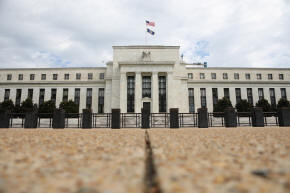Inflation beaten? 'Team Transitory' re-emerges :Mike Dolan
 Send a link to a friend
Send a link to a friend
 [August 03, 2022] By
Mike Dolan [August 03, 2022] By
Mike Dolan
LONDON (Reuters) -The post-pandemic
inflation surge clearly persisted too long for central banks to ignore -
but investors sceptical of some multi-year regime change or paradigm
shift still feel emboldened.
After a bruising start to the year, world markets caught a break in
July.
Some relief was perhaps due after Ukraine-related energy and food price
shocks in February compounded a post-pandemic inflation spike and forced
months of dramatic re-pricing of interest rate, bond and stock markets.
The sort of synchronised monetary policy tightening investors braced for
- described by the International Monetary Fund last week as
"historically unprecedented" - is now well underway and recession fears
mount as economic forecasts are slashed.
Rates markets are already peering over the hump and despite all the
hawkishness from central banks feel the worst of the episode may have
passed - even if visibility is limited for policymakers and investors
alike.
Futures markets now see U.S. Federal Reserve policy rates peaking by the
turn of the year at about 3.35% - about one percentage point above
current rates, but also some 65 basis points below where they saw the
so-called 'terminal rate' in mid-June and now occurring three months
earlier than assumed back then.

As significantly, they pencil in about half a point of rate cuts from
there through 2023.
Exaggerated a bit by this week's U.S.-China tensions over Taiwan,
10-year U.S. Treasury yields dropped almost a full percentage point in
just six weeks to as low as 2.51% while inflation-adjusted yields fell
back to zero. The inversion of 2-10-year yield curve, often cited as the
most accurate harbinger of recession, deepened to most since the dot.com
recession at the turn of the century.
And significantly, market inflation expectations captured in both five-
and 10-year index-linked bonds are both now solidly back below 3% - the
latter below 2.5%. What's more, Brent crude oil prices - down almost 30%
from March peaks - dipped back below $100 per barrel this week and wheat
futures have returned to pre-Ukraine invasion levels as ships resumed
deliveries of Ukrainian grain this week.
While recession pricing and the monetary policy squeeze may explain much
of this, hardy fans of the much-lampooned 'transitory' inflation thesis
- abandoned by the Fed and other central banks late last year - feel the
latest twist just underlines how the post-pandemic inflation surge
remains primarily a supply shock that will ultimately normalise.
Overall demand in the economy will prove to be little different when
these distortions wash out and super-easy monetary settings from
pandemic are removed, they argue.
In a presentation to the G20 last month, Bank for International
Settlements economist Hyun Song Shin reinforced the supply shock message
by showing how inflation jumped even though the rebound in real GDP in
both developed and emerging economies remained substantially below the
five-year pre-pandemic trend.
[to top of second column] |

The Federal Reserve building is pictured in Washington, DC, U.S.,
August 22, 2018. REUTERS/Chris Wattie/File Photo

"The charts...reinforce the message that the recent surge in inflation is not
simply a story of excess demand that overwhelmed the pre-pandemic trend supply
of the economy," he wrote. "Rather, it is a case of diminished supply capacity
that has not kept pace with the recovery to trend."
SUB POTENTIAL
Citing that speech, hedge fund manager Stephen Jen at Eurizon SLJ said it seemed
odd why consensus now felt an even wider output gap was now necessary when
inflation would subside anyway over coming quarters as aggregate supply
normalised.
"There does not seem to be sufficient appreciation for the fact that the global
economy is still operating at levels substantially below its historical
potential," he said.
"My own guess is that, over time, much of the inflation plaguing the world now
will eventually turn out to be 'transitory'...driven by supply-side factors that
are not permanent, are beyond the control of central banks, and will most likely
not contaminate long-run inflation expectations."
For Jen, myriad arguments in support of a new era of higher inflation - from
changing geopolitics, 'de-globalisation' and supply chain rethinks to ageing
demographics, tight labour markets and an energy transition - have mostly been
assembled after the inflation surge and remain unproven at best as durable
long-term factors.
But if inflation does indeed subside again over coming quarters, he argues that
higher equities, lower bond yields and a slightly weaker dollar will be the
result.
While other investors sympathise with this view, they feel the uncertainties are
just too great in the midst of a tightening cycle to bet the farm on either
outcome just yet. And many asset managers appear reluctant to jump on July's
rally.
"We lean more towards fading the rally in risk assets than chasing it," said
Paul O'Connor, head of Multi-Asset at Janus Henderson Investors. "We can
envisage a fundamental path higher for risk assets from here, but it is a narrow
one."

The problem for anyone trying to work this out is that even if you believe this
bout of inflation is just down to temporary supply distortions, unpredictable
political calculations make it impossible to time a resolution with any surety.
And converts to the idea of a 'new paradigm' think the longer those distortions
persist, the more inflation expectations will entrench anyway.
The energy, food and supply chain skews related to tensions over Ukraine or
souring relations between Washington and Beijing over Taiwan - not to mention
the outcome of November's mid-term U.S. congressional elections - mean guesswork
more than conviction will likely dominate the rest of the year.
The author is editor-at-large for finance and markets at Reuters News. Any views
expressed here are his own
(by Mike Dolan, Twitter: @reutersMikeD; Editing by Josie Kao)
[© 2022 Thomson Reuters. All rights
reserved.]This material may not be published,
broadcast, rewritten or redistributed.
Thompson Reuters is solely responsible for this content. |